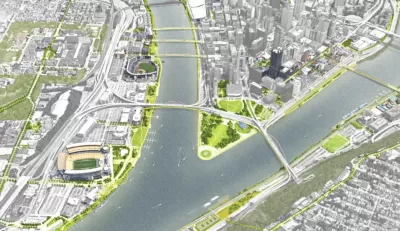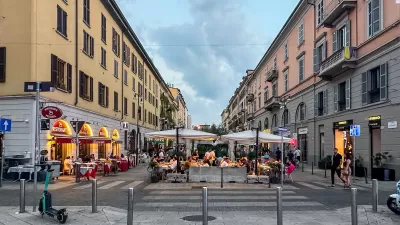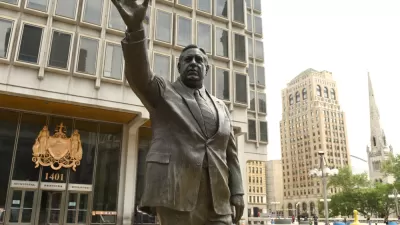Riverlife and evolveEA were honored by the American Planning Association (APA) for the plan, which outlines a 10-year vision to connect, enhance, and expand Pittsburgh’s network of riverfront parks, trails, and public green spaces.

The Completing the Loop plan for Pittsburgh’s riverfronts, developed by Riverlife and evolve environment :: architecture, received an American Planning Association (APA) award through the Sustainable Communities Division at its annual National Planning Conference. The Sustainable Communities Division Awards for Excellence in Sustainability is an annual program that honors projects, plans, policies, individuals, and organizations dedicated to supporting sustainable communities. Each year, the award winners are announced during the annual National Planning Conference. The Completing the Loop plan outlines a ten-year vision to complete, enhance, and expand the 15-mile, 1,050-acre network of riverfront trails and green space centered on Downtown Pittsburgh and adjacent neighborhoods.
Riverlife envisions a Pittsburgh where thriving world-class riverfronts are essential to the region and belong to everyone.
“Twenty years after creating the first public vision for the redevelopment of the riverfronts, Riverlife has taken stock of what has been done, what needs to be done to address the remaining gaps, and how to improve the experience so that it is enjoyed by all,” says Matthew Galluzzo, President and CEO for Riverlife, “Completing the Loop is a uniquely Pittsburgh approach that hinges on the broad-based partnerships that we cultivate, especially with community members and property owners.”
The plan prioritizes access for neighborhoods that have been disconnected by infrastructure such as highways and railroads and proposes a system of equitably located facilities, services, and amenities.
“As cities are reimagining waterfronts as public spaces, Completing the Loop as a process and a report exemplify inventive, data-driven placemaking concepts centered around environmental and social justice,” says LaShawn Burton-Faulk, Executive Director for Manchester Citizens Corporation and board member for Riverlife.
Completing the Loop’s Technical Assessment outlines key steps for the Allegheny, Monongahela, and Confluence “River Rooms” and identifies partners, projects, timelines, and issues critical to completion. A customized scorecard rates progress for the Loop’s 25 segments and recommends how to improve each segment’s score, which rates Connectivity, Places, Maintenance, Ecology, and Experience.
The Plan is publicly available at https://evolveea.com/riverlife/.
Completing the Loop is made possible with funding from the Pennsylvania Department of Conservation & Natural Resources (DCNR) and the Henry L. Hillman Foundation.
FULL STORY: "Completing the Loop” Plan Wins National Award for Excellence in Sustainability

Maui's Vacation Rental Debate Turns Ugly
Verbal attacks, misinformation campaigns and fistfights plague a high-stakes debate to convert thousands of vacation rentals into long-term housing.

Planetizen Federal Action Tracker
A weekly monitor of how Trump’s orders and actions are impacting planners and planning in America.

In Urban Planning, AI Prompting Could be the New Design Thinking
Creativity has long been key to great urban design. What if we see AI as our new creative partner?

King County Supportive Housing Program Offers Hope for Unhoused Residents
The county is taking a ‘Housing First’ approach that prioritizes getting people into housing, then offering wraparound supportive services.

Researchers Use AI to Get Clearer Picture of US Housing
Analysts are using artificial intelligence to supercharge their research by allowing them to comb through data faster. Though these AI tools can be error prone, they save time and housing researchers are optimistic about the future.

Making Shared Micromobility More Inclusive
Cities and shared mobility system operators can do more to include people with disabilities in planning and operations, per a new report.
Urban Design for Planners 1: Software Tools
This six-course series explores essential urban design concepts using open source software and equips planners with the tools they need to participate fully in the urban design process.
Planning for Universal Design
Learn the tools for implementing Universal Design in planning regulations.
planning NEXT
Appalachian Highlands Housing Partners
Mpact (founded as Rail~Volution)
City of Camden Redevelopment Agency
City of Astoria
City of Portland
City of Laramie





























